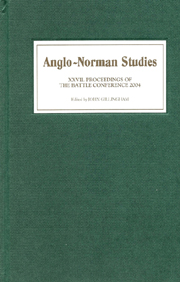Book contents
- Frontmatter
- Contents
- LIST OF ILLUSTRATIONS
- EDITOR'S PREFACE
- ABBREVIATIONS
- Probing the Passions of a Norman on Crusade: the Gesta Francorum et aliorum Hierosolimitanorum
- Gilbert Foliot et l'Ecriture, un exégète en politique
- Writing Warfare, Lordship and History: the Gesta Consulum Andegavorum's Account of the Battle of Alençon
- Anglo-French Peace Conferences in the Twelfth Century
- Peter of Blois and the Problem of the ‘Court’ in the Late Twelfth Century
- Normandy and Norman Identity in Southern Italian Chronicles
- Monastic Chronicles in the Twelfth-Century Abruzzi
- The Impact of Rebellion on Little Domesday
- Setting Things Straight: Law, Justice and Ethics in the Orationes of Lawrence of Durham
- The Angevin Kings and Canon Law: Episcopal Elections and the Loss of Normandy
- Zooarchaeology of the Norman Conquest
- Was Thomas Becket Chaste? Understanding Episodes in the Becket Lives
Anglo-French Peace Conferences in the Twelfth Century
Published online by Cambridge University Press: 12 September 2012
- Frontmatter
- Contents
- LIST OF ILLUSTRATIONS
- EDITOR'S PREFACE
- ABBREVIATIONS
- Probing the Passions of a Norman on Crusade: the Gesta Francorum et aliorum Hierosolimitanorum
- Gilbert Foliot et l'Ecriture, un exégète en politique
- Writing Warfare, Lordship and History: the Gesta Consulum Andegavorum's Account of the Battle of Alençon
- Anglo-French Peace Conferences in the Twelfth Century
- Peter of Blois and the Problem of the ‘Court’ in the Late Twelfth Century
- Normandy and Norman Identity in Southern Italian Chronicles
- Monastic Chronicles in the Twelfth-Century Abruzzi
- The Impact of Rebellion on Little Domesday
- Setting Things Straight: Law, Justice and Ethics in the Orationes of Lawrence of Durham
- The Angevin Kings and Canon Law: Episcopal Elections and the Loss of Normandy
- Zooarchaeology of the Norman Conquest
- Was Thomas Becket Chaste? Understanding Episodes in the Becket Lives
Summary
Few historical problems have received so much attention among those studying the modern period and so little attention among medieval scholars as that of peacemaking. Searching the shelves of any university library it soon becomes evident that the issue of peacemaking has been tackled from many angles in the modern period, so that, for instance, the 1919 conference of Paris intended to settle the unresolved issues of the FirstWorldWar has seen studies from the vantage point of almost every individual nation represented on that occasion. Yet a similar search of the literature for the medieval period yields little on the subject of peacemaking. War, by contrast, carries an extensive literature for the medieval period, ranging from the detailed study of battles, foot soldiers, tactics and strategy by Verbruggen to studies of weapons, castles, the chivalric code or even the laws of war in the later Middle Ages. This lack of secondary literature on the subject of peacemaking was highlighted in 1998 by Professor Christopher Holdsworth in an article entitled ‘Peacemaking in the Twelfth Century’ published in Anglo-Norman Studies 14, 1996 (1997). In his article Holdsworth investigated the practices surrounding the making of peace in agreements concluded during the reigns of Henry I and Henry II, and showed that they all had certain themes in common: envoys and mediators, hostages, and the provisions made for keeping the terms agreed. It is, however, one feature of peacemaking that received little attention by Holdsworth that will be the focus of this discussion; namely peace conferences, and more specifically, the sites of the face-to-face, personal encounters.
- Type
- Chapter
- Information
- Anglo-Norman Studies 27Proceedings of the Battle Conference 2004, pp. 52 - 67Publisher: Boydell & BrewerPrint publication year: 2005



